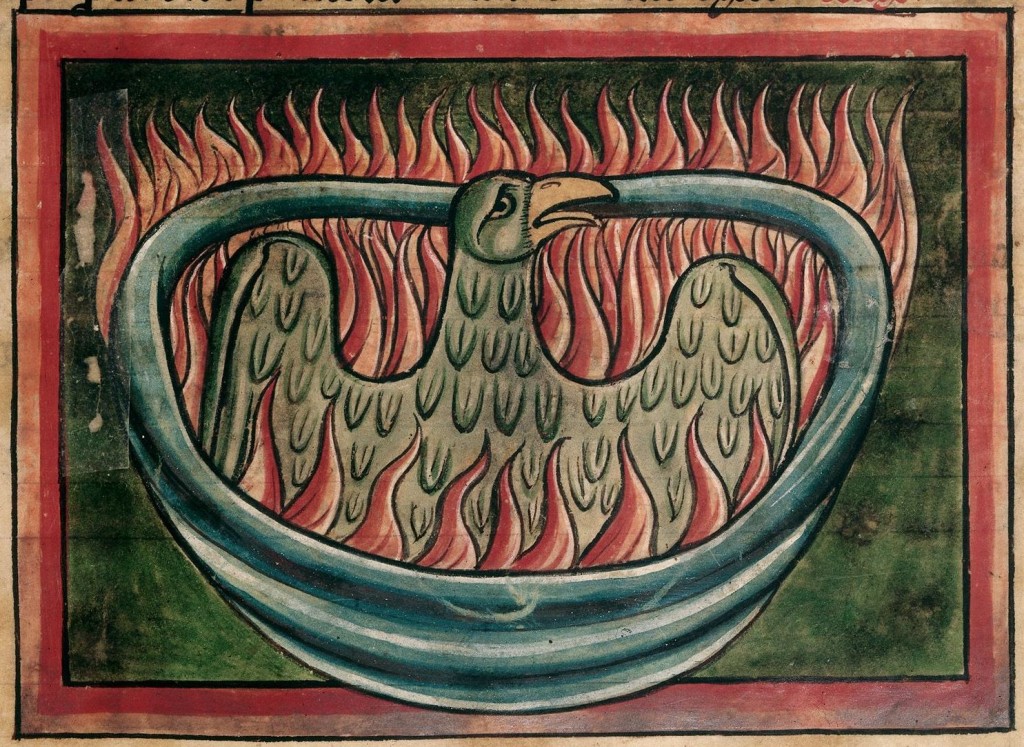
As part of Notre Dame’s ongoing Old English translation and recitation project, I offer a creatively translated section from the Exeter Book (Exeter Cathedral Library MS 3501) Phoenix (lines 1-49), which I have titled “Æþelast Lond” (“Homeland”) and which describes the heavenly home of the mythological phoenix. As a translation, “Æþelast Lond” is an adapted and interpretive rendition of the Exeter Book poem, and should not be taken as a literal translation of the Old English.
Old English Phoenix (1-49):
Hæbbe ic gefrugnen þætte is feor heonan
eastdælum on æþelast londa,
firum gefræge. Nis se foldan sceat
ofer middangeard mongum gefere
folcagendra, ac he afyrred is
þurh meotudes meaht manfremmendum.
Wlitig is se wong eall, wynnum geblissad
mid þam fægrestum foldan stencum.
ænlic is þæt iglond, æþele se wyrhta,
modig, meahtum spedig, se þa moldan gesette.
ðær bið oft open eadgum togeanes
onhliden hleoþra wyn, heofonrices duru.
þæt is wynsum wong, wealdas grene,
rume under roderum. Ne mæg þær ren ne snaw,
ne forstes fnæst, ne fyres blæst,
ne hægles hryre, ne hrimes dryre,
ne sunnan hætu, ne sincaldu,
ne wearm weder, ne winterscur
wihte gewyrdan, ac se wong seomað
eadig ond onsund. Is þæt æþele lond
blostmum geblowen. Beorgas þær ne muntas
steape ne stondað, ne stanclifu
heah hlifiað, swa her mid us,
ne dene ne dalu ne dunscrafu,
hlæwas ne hlincas, ne þær hleonað oo
unsmeþes wiht, ac se æþela feld
wridað under wolcnum, wynnum geblowen.
Is þæt torhte lond twelfum herra,
folde fæðmrimes, swa us gefreogum gleawe
witgan þurh wisdom on gewritum cyþað,
þonne ænig þara beorga þe her beorhte mid us
hea hlifiað under heofontunglum.
Smylte is se sigewong; sunbearo lixeð,
wuduholt wynlic. Wæstmas ne dreosað,
beorhte blede, ac þa beamas a
grene stondað, swa him god bibead.
Wintres ond sumeres wudu bið gelice
bledum gehongen; næfre brosniað
leaf under lyfte, ne him lig sceþeð
æfre to ealdre, ærþon edwenden
worulde geweorðe. Swa iu wætres þrym
ealne middangeard mereflod þeahte,
eorþan ymbhwyrft, þa se æþela wong,
æghwæs onsund, wið yðfare
gehealden stod hreora wæga,
eadig, unwemme, þurh est godes;
bideð swa geblowen oð bæles cyme,
dryhtnes domes, þonne deaðræced,
hæleþa heolstorcofan, onhliden weorþað.
Old English Phoenix from edition by Bernard Muir, The Exeter Anthology of Old English Poetry, Volume I, Exeter: University of Exeter Press, 2000: 164-187; a reproduced edition is also available online.
“Æþelast Lond” (“Phoenix-Land”): A Modern English Translation by Richard Fahey
Translator’s Preface
“I have heard that hence in faroff dales
Are Eastern fabled fields,
A fay realm known yet impossible and impassible
To human folk of earthen mold,
Guarded and disguised and determined,
Purged of evil and impurity.
A place of winsome wonder, blessed with edenic bliss
And the fairest fragrance of paradise.
That island is enigma: the celestial—terrestrial
Handiwork of a sublime and ancient architect,
Landscaped creation of the master craftsman and eternal gardener.
Where often the divine doors of revelation lie open,
Unlocked and inviting those saintly paragons with angelic harmony.
The spirit animates those green groves ruminating under starry canopy.
There it never storms, neither rain nor snow
Nor breath of frost, nor blast of fire,
Nor fall of hail, nor drizzle of rime,
Nor heat of the sun, nor constant cold,
Nor warm weather, nor wintery squall,
Harms at all that paradise—pleasant, peaceful, safe and sound.
The land is home, blooming, blossoming, lush and alive.
There stand no mountains, nor steep cascades,
Nor do stone cliffs tower high, as here with us,
Nor valley deep, nor dale, nor dune, nor hill
Nor ravenous ravine—not a scrap of fallow ground,
But a fertile field wriggling in the mist,
Thirsty, hungry and abloom.
That living land is enlightened: a plane—a plain
Twelve fathoms farther, higher than those proud,
Converging crests, peaking, glistening snowcaps,
Scraping the sky, piercing the constellations,
Brighter, brilliant, a beaming place of epiphany and sagely wisdom.
The runic riddles of writing often witnessed
By arcane tomes and ancient inscription.
Serenity and solar germination, sunshine begets
Evergreen wilderness and fathers those fruit-bearing trees,
Forests and orchards forever dressed in foliage and harvest,
Arboreal arms that refuse to shed their leafy fingers.
Winter or summer, the wood is the same, preserved unto the ages
Never the wind sheer its branches, nor flame lick its trunk
Until transformation becomes the world.
When the prehistoric waters surged in tidal fury
Of the universal flood which drowned all the earth,
Overwhelmed the world with waves, yet this sanctuary outlasted
Stood protected and untouched, beyond the ocean’s titanic maw.
Wholesome and unmarred, through grace and faith
Endures, abides, fruits and flowers until the fiery advent and cataclysm,
The doom predestined, when the hall of the dead,
Crypts and catacombs—the tombs of heroes are unleashed.”
Richard Fahey
PhD Candidate
University of Notre Dame
